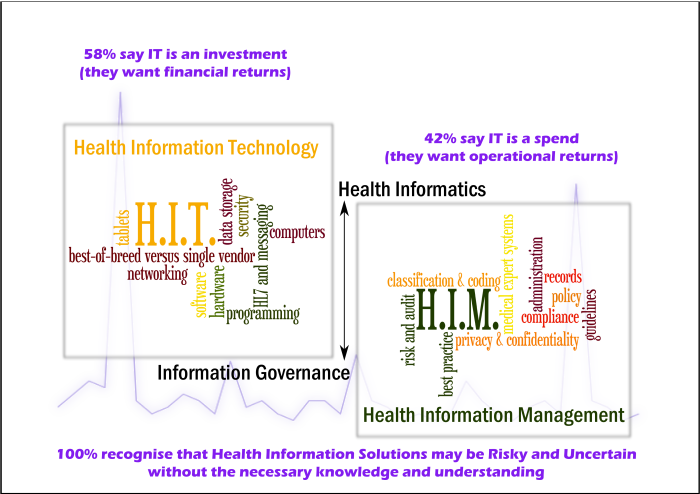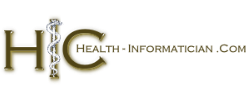Health Informatics…
…goes much further than just computing and networks. It is the merger of IT and systems, biomedicine, law, information management and change.
To comprehensively understand the components of the discipline, take a quick look at the more than 350 topics in the Diploma in Health Informatics course listed here covering the usual suspects:
- computers
- networks
- security
- applications
- procurement
- project management, etc
plus those specific to ‘Healthcare’:
- robotics and telemedicine
- artificial intelligence and clinical decision support systems
- coding
- classification
- electronic medical record
- grouping and analysis of health data
- inter-system interfacing
- messaging standards
and the challenges brought by the need for joined up care and sharing of data across organisations, whilst at the same time securing and protecting patients’ rights to privacy and confidentiality.

The term Health Informatics is new to many but the work has been around for a while. Ten years ago, the United States 2004 State of the Union Address announced that the majority of Americans would have an electronic medical record within ten years. President Obama took it further to support passage of the HITECH Act, providing a regulatory and financing framework to support the goals for health information technology. Similar initiatives in other countries and in different forms have helped us come a long way in the past ten years.
Most physician / general practitioners have electronic medical records in place and it would be nearly impossible for hospital clinicians to do business today without their IT tools.
The way we provide care is changing and the way we account for costs too. As in our daily lives, we rely on the presence of point-of-service tools, interactive apps as well as behind-the-scenes large scale data analyses. Patients understand that clinicians using information tools deliver better care than those without.
We have come a long way. Have a look at this Institute of Healthcare Management article to explore a little more.
Health Informaticians are the new breed
Health Informaticians are the new breed
Health services are recognising that there are significant gains to be made through improvements in technology and communications. For example the latest Scottish e-health strategy emphasises five main initiatives:
- to use information and technology to maximise efficiency and savings
- to enable people to communicate with the service
- to pursue care integration
- to improve the availability of information, and
- to improve the safety of people taking medicines.
Safety, information, communication and integration are at the forefront of the next phase of development.
This all puts health informatics skills and qualifications in demand!
Governments around the world are citing concern about the serious risks that skills and labour shortages in health informatics and health information management will manifest.
The USA needs 50,000 new workers by 2015. Canada needs 12,000 in 2014 and Australia needs to recruit and broaden the skills of 78% of their projected 2014 workforce.
The American Board of Medical Specialities’ recently approved clinical informatics as a board-certified subspeciality.
Studying Health Informatics
Taking a higher education study program can be prohibitively expensive and the content can be increasingly out-of-touch with both reality and our modern lifestyles:
- you pay to study where you may not want to be, adding accommodation costs to your bill
- you can’t fit your education around other commitments such as job and family life
- there is little to meet your needs and circumstances to progress at your own speed, and
- learning materials seldom keep abreast with developments and trends.
To cap it all off, there are only a few Health Informatics programs available at this time.
The online programs at www.health-informatics.co
Our online programs are delivered flexibly to participants whenever and wherever best suits them.
Of 830 of our students campaigned in 2013, roughly 2/3rds chose to study in ‘block’ and ‘at convenient times’ with an equal spread choosing daytime hours versus out-of-hours / weekends. It wasn’t clear, whether this was due more to personal discipline or our electronic reminder system but what was clear, was the fact that students wish to study when they want – and this we provide.
Our learning materials are relevant to the needs and are of direct practical application, allowing the participant to explore more the topics that meet their current needs and interests whilst developing an informed awareness of the discipline’s overall subject breadth.
Above all, we cut costs to something everyone can afford.
Although Health Informatics is an emerging discipline, we have a fifteen year pedigree. The core courseware comprising the Certificate in Health Informatics was an integral part of the University of Kent’s “Health Care Information Management and Systems” module of their MSc in Surgical Practice (no longer running) from 2000 to 2011.
In January 2013 the UK Council for Health Informatics Professions (UKCHIP) accredited both the CHI and the DipHI programs.
Click on a link below to explore each program and its accreditations and endorsements in detail:



